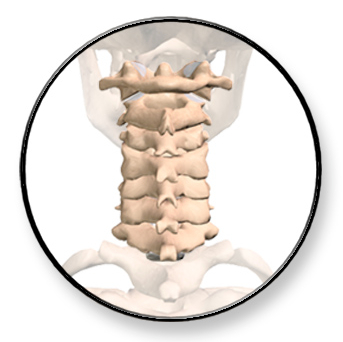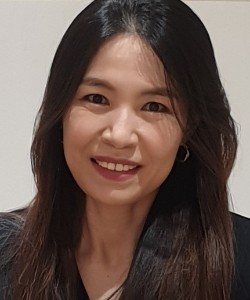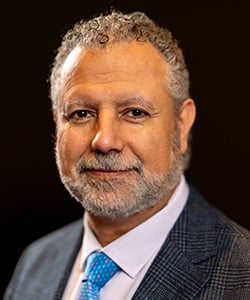
January 18, 2022, 7:00-8:00 pm ET
Live Webinar
Registration is now closed.
The past two decades have witnessed a surge in the use of cervical spine joint procedures including joint injections, nerve blocks, and radiofrequency ablation to treat chronic neck pain, yet many aspects of the procedures remain controversial. Join the webinar to hear Drs. Magda Anitescu, Steven P. Cohen, Robert Hurley, Jee Youn Moon, Samer Narouze, and David Provenzano discuss the latest "Consensus Practice Guidelines on Interventions for Cervical Spine (Facet) Joint Pain from a Multispecialty International Working Group."
This one-hour live webinar offers 1 CME credit.
Register
Program
| 7:00 pm ET | Welcome and Introductions | Magdalena Anitescu , MD, PhD (moderator) |
| 7:05 pm ET | Optimal Technical Aspects for Cervical RFA | David Provenzano , MD |
| 7:14 pm ET | Sedation | Steven Cohen, MD |
| 7:23 pm ET | Prognostic Value of IA vs. MBB | Robert Hurley, MD, PhD |
| 7:34 pm ET | Safety with Cervical Facet Interventions | Samer Narouze, MD, PhD |
| 7:43 pm ET | Optimal Cutoff for Selecting Patients for RFA | Jee Youn Moon, MD, PhD |
| 7:52 pm ET | Panel Discussion and Q&A | All |
| 8:00 pm ET | Adjournment |
Faculty
View all faculty disclosures.
Scientific/Education Planning Committee:
Andrea Chadwick, MD; University of Kansas School of Medicine, Leawood, KS
Ki-Jinn Chin, MBBS, FANZC, FRCPC; Toronto Western Hospital, Toronto, Ontario
Steven Cohen, MD; Johns Hopkins & Walter
Reed, Clarksville, MD
Samer Narouze, MD, PhD; Western Reserve Hospital,
Cuyahoga Falls, OH
Faculty:

Steven P. Cohen, MD, obtained his medical degree at Mount Sinai, completed an anesthesiology residency at Columbia University, and a pain fellowship at Massachusetts General Hospital. He is professor of anesthesiology & critical care medicine, neurology and physical medicine & rehabilitation at the Johns Hopkins School of Medicine and Uniformed Services University of the Health Sciences. He is also Chief of Pain Medicine and Director of the Blaustein Pain Treatment Center at Johns Hopkins and a retired army colonel.

Robert Hurley, MD, PhD, is an academic triple threat with leadership in research, education, and administrative domains across acute and chronic pain. He specializes in developing systemwide pain programs and pain policy advocacy at the state and national level and is currently practicing at Wake Forest. His pain training started at McGill in undergrad, includes MD/PhD from University of Chicago and clinical training at Johns Hopkins. His publications include over 110 papers and book chapters (Miller, Barash, Bonica).

Jee Youn Moon, MD, PhD, is an associate professor in the department of anesthesiology and pain medicine at the Seoul National University College of Medicine in Seoul, South Korea. She has published about 80 articles in SCI journals, ranging from “Deep spinal infection after outpatient epidural injections for pain: A retrospective sample cohort study using a claims database in South Korea” in Anesthesiology (2021;134:925-36) to “Neuromodulation for chronic pain” in Lancet (2021;397:2111-24). Dr. Moon received the Award for Excellent Research Prize 5 times from the Korean Pain Society. She represented the Korean Pain Society for making the "Consensus practice guidelines on lumbar and cervical facet joint pain interventions from a multispecialty, international working group." Dr. Moon won the Best Speaker Award from the Korean Pain Society for the field of ultrasound-guided pain medicine as well. Her current interests are in the management of complex regional pain syndrome (CRPS) with neuromodulation, opioid safety, and ultrasound-guided pain interventions. She has delivered several lectures at the World Institute of Pain (New York, Budapest, Taipei, etc.), International Association for the Study of Pain (2021 online CRPS SIG), American Academy of Pain Medicine (Phoenix, San Francisco, Vancouver, Denver, and Washington, DC), ASRA Pain Medicine (San Francisco, Phoenix), World Academy of Pain Medicine United (Miami and Taipei), and Bengal, Chinese, Bangladesh, and Malaysian Pain Societies. Dr. Moon is a chief director of the International Cooperation of the Korean Pain Society and the editorial board of journals (Pain Medicine and Korean Journal of Pain). She is also concurrently the chief director of the Pain Center at Seoul National University Hospital.


Dr. Provenzano has served as a principal investigator on multiple research studies and published numerous scientific articles. His research interests include neuromodulation and monopolar and bipolar radiofrequency lesioning. He has lectured at numerous international and national meetings on the management of acute and chronic pain. Furthermore, he serves as an external member of the Robert Morris University IRB. He serves on the Board of Directors of the American Society of Regional Anesthesia and Pain Medicine as the President-Elect. He has extensive interests and expertise in the conservative treatment of pain originating from the cervical and lumbar spine, neuromodulation and in the utilization of ultrasound for interventional pain management procedures.
CME-CPD
To receive your CME certificate
- Download the Credit Claim Form.
- Indicate the number of hours you attended (credit will be verified against registration).
- Send the completed form to [email protected].
- Your certificate will be emailed to you within 1 week.
Educational objectives
After participating in this educational activity, participants should be able to:
- Optimize and personalize techniques to maximize the chance of successful cervical medial branch radiofrequency ablation (RFA).
- Describe the effects of sedation on diagnostic block validity.
- Articulate the pros and cons of different diagnostic block cutoff thresholds for selecting candidates for RFA.
- Recognize and understand the differences between intra-articular and medial branch blocks for selecting candidates for RFA.
- Formulate risk-mitigation strategies cervical facet joint interventions.
Target audience
This webinar is designed for the pain practitioners and surgeons who care for patients with cervical spine (facet) joint pain.
Accreditation and credit designation statements
| Credits by Day | Maximum |
| January 18, 2022 | 1.00 |
| Total Credits | 1.00 |
Physicians
The American Society of Regional Anesthesia and Pain Medicine is accredited by the Accreditation Council for Continuing Medical Education (ACCME) to provide continuing medical education for physicians.
The American Society of Regional Anesthesia and Pain Medicine designates this internet live activity (“course”) for a maximum of 1.00 AMA PRA Category 1 Credits™. Physicians should claim only the credit commensurate with the extent of their participation in the activity.
PAs (Physicians Assistants)
AAPA accepts certificates of participation for educational activities certified for AMA PRA Category 1 Credit™ from organizations accredited by ACCME or a recognized state medical society.
Physician assistants may receive a maximum of 1.00 hours of Category 1 credit for completing this program.
Nurse Practitioners
The American Association of Nurse Practitioners (AANP) accepts AMA PRA Category 1 Credits™ from organizations accredited by the ACCME. This activity has been approved for a maximum of 1.00 AMA PRA Category 1 Credits™.
Registered Nurses
Regulations dictate that only physicians may earn CME credits, however, many state Boards of Registered Nursing accept AMA PRA Category 1 Credits™ from organizations accredited by the ACCME. Attendees
are responsible for confirming their specific board’s acceptance of ASRA Pain Medicine-provided credits. This activity has been approved for a maximum of 1.00 AMA PRA Category 1 Credits™.
The American Board of Anesthesiology® MOCA®
This activity contributes to the CME requirements for Part II: Lifelong Learning and Self-Assessment of the American Board of Anesthesiology’s (ABA) redesigned Maintenance of Certification in Anesthesiology Program® (MOCA®), known as MOCA
2.0™. Please consult the ABA website, www.theABA.org, for a list of all MOCA 2.0 requirements. Maintenance of Certification in Anesthesiology
Program® and MOCA® are registered certification marks of The American Board of Anesthesiology®.
ASRA Pain Medicine is an ABA-approved provider and, as a service to ASRA Pain Medicine members and participants, CME credits are reported to the ABA. Participants must include their correctly formatted ABA ID number (34567890) during the online evaluation and credit claim process
available at the conclusion of the activity. Once the online evaluation and credit claim process is closed, certificates will be issued and credits reported to the ABA. After this time, participants may request their CME certificate by contacting
[email protected], but ASRA Pain Medicine will no longer report credits to the ABA, which will then be the individual participant’s responsibility.
International credits
Royal College of Physicians and Surgeons of Canada
The Royal College of Physicians and Surgeons of Canada has agreements based on the mutual recognition of credit points with the American Medical Association for live and web-based
(synchronous or asynchronous) educational events. You may submit your CME certificate directly for credit recognition of this accredited group learning activity (Section 1) as defined by the Maintenance of Certification program of The Royal
College of Physicians and Surgeons of Canada. For more information, visit: www.royalcollege.ca
European Accreditation Council for Continuing Medical Education (UEMS-EACCME)
The UEMS-EACCME has agreements based on the mutual recognition of credit points with the American Medical Association for live and e-learning educational
events. Each medical specialist should claim only those hours of credit that he/she actually spent in the educational activity. The EACCME is an institution of the European Union of Medical Specialists (UEMS): www.uems.net
Commercial support disclosure
No industry support has been received for this educational activity.
Disclosure and mitigation of personal conflicts of interest
View all faculty disclosures. In accordance with the ACCME’s Standards for Integrity and Independence and related policies, ASRA Pain Medicine is committed to ensuring balance, independence, objectivity, and scientific rigor in its continuing medical education and continuing professional development activities. Those in control of the educational content disclose all relationships (financial or other) with any ineligible company that they have had within the past 24 months. If an individual refuses to disclose, they are disqualified from participating. Disclosure information is evaluated to determine relevance and conflicts of interest mitigated. Disclosure of all relevant financial relationships is made to participants prior to the activity. Participants are asked to evaluate the objectivity and independence. Off-label or investigational use of a therapeutic product also is disclosed.
Check Out These Upcoming Programs
-
Apr16
-
Mar21